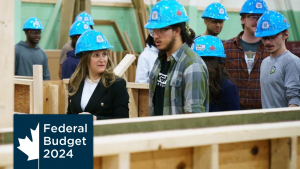Panellists taking part in the recent CanaData economic e-conference all acknowledged a labour shortage exists and is imminent in the industry, but several outlined there’s more variables to consider than just simply filling the upcoming void.
As more Canadian construction workers retire, labour force pressures will continue to increase over the next decade and construction demands may, at times, outstrip the available supply of skilled workers in some markets, said Bill Ferreira, executive director of BuildForce Canada, who was part of the panel entitled Addressing Labour Shortage Issues.
“Approximately 228,000 individuals will be entering the industry over this 10-year period,” said Bill Ferreira, “We will be losing approximately 260,000 individuals to retirement over the decade (leaving a recruitment gap of 31,000 workers which increases when coupled with demand growth) requiring the country to find an additional 80,000 individuals to work in the industry.”
Over the summer months, Canada experienced tight labour markets in many parts of the country and lower unemployment rates because employment has grown so much more than the labour force has.
“The narrowing of that gap is really what is leading to many of the pressures the industry has been experiencing, particularly in the four largest markets where we were expecting to see dramatic increases and investment growth: British Columbia, Ontario, Quebec and Nova Scotia but also in other provinces,” said Ferreira.
Labour mobility will be critical to minimizing the impact on the Canadian economy.
“Mobility is going to be a critical solution for the industry to continue to be able to move individuals around from areas where demand may be more moderate to areas where demand may be far higher,” he said, adding bringing in new workers will also be key. “We can certainly bring them in from other industries. We can certainly increase recruitment and also increase, hopefully, our ability to be able to bring some in through immigration.”
Lindsay Kearns, co-ordinator with the BC Centre For Women in the Trades, said one hypothesis is that the skilled trades labour force problem isn’t actually about supply, it’s about underlying prejudice that is preventing certain workers from accessing and thriving in skilled trades careers.
“Is it possible that there isn’t actually a labour shortage in the skilled trades sector but instead what we are looking at is a labour pool that’s been very limited on who its drawing from?” Kearns asked.
Three main issues women have are toxic workplace culture, lack of opportunities for advancement and a lack of a community of peers.
“They love their trade, they love their jobs and they want to be in this industry for the rest of their careers but what I hear constantly from tradeswomen…they can’t get hired, they are given fewer hours when they are on the job, they aren’t given leadership opportunities and every day they are undermined disrespected or outright bullied and harassed as they are trying to do their jobs,” Kearns explained.
“My call to action today is to make sure we are not confusing data with knowledge. We need to reconsider what questions we are asking when we are looking at skilled trades labour shortages. Who is starting in trades careers but not actually staying in the sector? What are the barriers that these people are facing? What is being done to make the skilled trades sector one that is attractive and sustainable for all workers?”
Henry D’Esposito, construction research lead with Jones Lang LaSalle, agreed the labour supply issue is more complicated than just recruiting workers. One factor that many don’t discuss is the issue of productivity and how construction has been done the same way since the mid-1900s.
“On one hand the solution is bring more people in, train more people, improve diversity and inclusion in the construction workforce but the other solution is get all of those workers producing more,” said D’Esposito. “One of the solutions here is technology. Over the next two years are we going to be able to bring enough people into the workforce to solve this problem? Probably not. Are we going to be able to implement enough technology to solve this problem? Probably not. Those things take a longer time so that’s why we are forecasting some of these challenges to continue and wage growth to continue over the next few years.”
Kearns suggested three main things companies can do to retain women and underrepresented groups: adjust the workplace culture, provide opportunities for advancement and create a community of peers, by hiring more women, BIPOC or LGBTQ+ individuals, instead of hiring just one.
“There needs to be a lot more education and training around that and making sure that everyone is engaged in having respect and dignity be the cornerstone of how we operate in a professional workplace,” said Kearns. “A little too much cowboy culture is still happening out on construction sites and we’ve got to say, ‘we’re professionals, we’re better than this and we don’t need to make the basis of our interactions with one another racist, sexist, homophobic jokes.’ Let’s focus on getting the job done.”
Follow the author on Twitter @DCN_Angela.











After 15 yrs in the trade. I regret not going to university like everyone told me to. It’s not the work that I dislike but the culture. Currently working with a crew full of racist, sexist, anti-mask-vaccine, conspiracy theorists. Good pay and benefits but truly a miserable career.
While the pandemic is the main cause- free money from the government why do you need to work? -. I am a pro government covid benefit for the people who truly need them but I am against abusing the free money, I have a neighbor who has not worked since the pandemic. He put the blame on COVID which is untrue. He is lazy and he is been doing hard drugs because of goverment free money.
So the simple answer, no more free money please .